
|
|
|
|
|
|
|
 |
|
 |
|
|
|
|
Our site is 256 bit SSL SECURED. SSL (Secure Socket Layer) is the industry standard for viewing and sending sensitive information
on an internet browser. Click on the SSL image below see our site report.
|

|
|
|
 |
|
 |
|
|

|
 |
|
 |
|
|
|
|
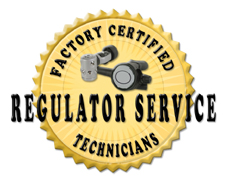 A
scuba regulator is a complex piece of life-support equipment. It represents a considerable amount of
investment and value. Over the life of your regulator, contaminates from sand, salt, and chlorine can
corrode your regulator, affecting performance and reliability. That is why it is necessary to have your
gear serviced by a certified technician. A
scuba regulator is a complex piece of life-support equipment. It represents a considerable amount of
investment and value. Over the life of your regulator, contaminates from sand, salt, and chlorine can
corrode your regulator, affecting performance and reliability. That is why it is necessary to have your
gear serviced by a certified technician.
 As of
January 1, 2017, DIVING FOR FUN will
NOT be servicing regulators. However, we wanted to continue to provide
our step-by-step regulator repair procedures as a reference for all our past customers. As of
January 1, 2017, DIVING FOR FUN will
NOT be servicing regulators. However, we wanted to continue to provide
our step-by-step regulator repair procedures as a reference for all our past customers.
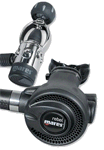 The
regulator is inspected by our technician to determine the cost of repair. This way we can
contact the customer before proceeding if it looks like the regulator repair may exceed the value of
a new one. The
regulator is inspected by our technician to determine the cost of repair. This way we can
contact the customer before proceeding if it looks like the regulator repair may exceed the value of
a new one.- Prior to disassembly, both the first stage and second stage regulators performance is
measured and a leak test performed to determine the regulators pre-service functionality.
- The first stage of the regulator is disassembled.
- All metal parts are placed in the ultra sonic cleaner, and a chrome-safe acidic
solution is used to dissolve all corrosion and undesirable sea-life growth.
- All plastic/rubber and silicone parts are washed and then treated with a silicone spray.
- Metal parts are removed, washed in a neutralizing solution, dried, and then polished.
- All parts are visually inspected to determine if any parts show excessive wear to suggest
a revised service interval to the customer. For example, an Instructor or Divemaster performing
hundreds of dives per year may well need to have there regulators serviced every 3-4 months,
not once per year as recommended.
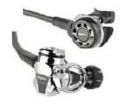 The
new parts kit recommended by the manufacture that must be replaced during annual servicing are
checked for compatibility and completeness. The
new parts kit recommended by the manufacture that must be replaced during annual servicing are
checked for compatibility and completeness.- The parts to be replaced vary depending on the model of regulator, but all O-rings and filters are
replaced. The High Pressure Seat Diaphragm may also be replaced.
- The 1st stage regulator is then assembled, and adjusted to the manufacturers specification.
- The second stages are then disassembled.
- The Submersible Pressure Gauge (SPG) or console high-pressure joints are disassembled and all metal parts cleaned.
All high-pressure console high-pressure o-rings are replaced, and lubricated with grease prior to assembly
- The SPG is assembled, and its pressure indication compared against a master gauge.
- All metal parts and hose fittings are placed in the ultra sonic cleaner.
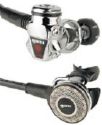 All
plastic parts are washed and treated with silicone. All
plastic parts are washed and treated with silicone.- All new parts that are recommended by the manufacturer to be replaced during annual servicing are
inspected.
- The mouthpiece is inspected and inhalation and exhalation diaphragms are carefully checked.
- The regulator body is checked for cracks.
- The second stages are assembled.
- The regulator is now tested on the flow bench.
- The first stage is adjusted to the manufacturer's specification on Internal Pressure (IP).
- Both 2nd stage regulators are now reconnected to the first stage and both 2nd stage
regulators are now tested for inhalation resistance, purge button functionality, and adjusted
to the manufacturers specification while supplied by Intermediate Pressure (IP) air from the users
1st stage. This matching process assures the best possible performance of the regulator
set as a ‘matched system‘, and explains why some second stage regulators don not work so well when
connected to another manufacturers 1st stage that utilizes a slightly different
intermediate pressure .
- Both 2nd stages are adjusted to the manufacturer's specification on breathing and exhaling resistance.
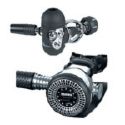 After
all checks and adjustments, the regulator is fully pressurized at maximum working pressure
(3,000psi) then submerged in a leak test bath to confirm that all the regulators, hoses and connectors
are gas tight. After all checks and adjustments, the regulator is left fully pressurized for 1 hour
to make sure there are no leaks or IP creep. After
all checks and adjustments, the regulator is fully pressurized at maximum working pressure
(3,000psi) then submerged in a leak test bath to confirm that all the regulators, hoses and connectors
are gas tight. After all checks and adjustments, the regulator is left fully pressurized for 1 hour
to make sure there are no leaks or IP creep.
NORMAL TURNAROUND TIME FOR SERVICE IS TWO (2) WEEKS
|
 |
If you need additional information or have questions,
we can be reached at our Contact Us page or visit our
Sign Up page.
|
 |
|
|
|
|
|
 |
|
 |
|

|